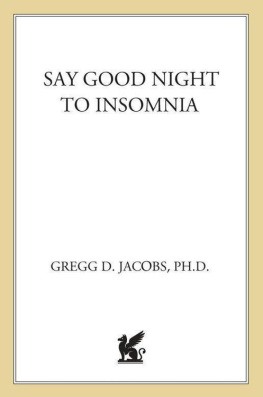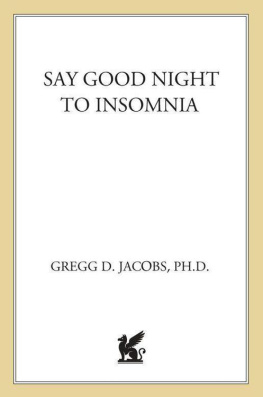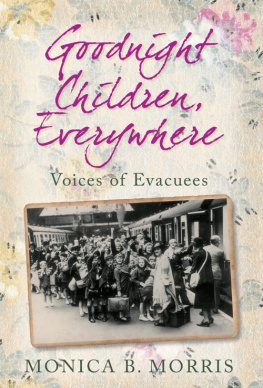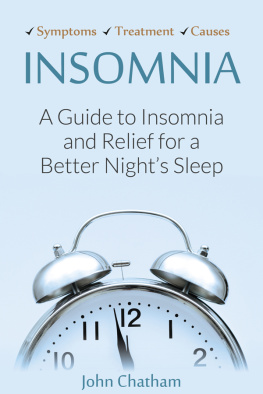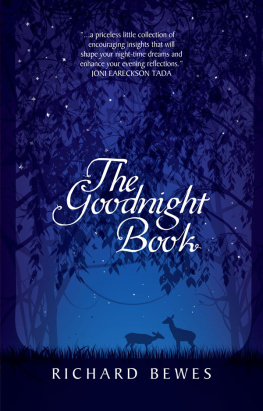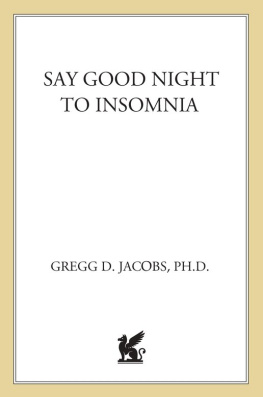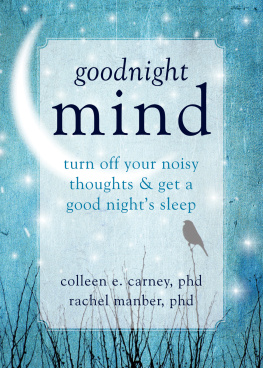Gregg D. Jacobs - Say Goodnight to Insomnia
Here you can read online Gregg D. Jacobs - Say Goodnight to Insomnia full text of the book (entire story) in english for free. Download pdf and epub, get meaning, cover and reviews about this ebook. publisher: Rodale Press, genre: Romance novel. Description of the work, (preface) as well as reviews are available. Best literature library LitArk.com created for fans of good reading and offers a wide selection of genres:
Romance novel
Science fiction
Adventure
Detective
Science
History
Home and family
Prose
Art
Politics
Computer
Non-fiction
Religion
Business
Children
Humor
Choose a favorite category and find really read worthwhile books. Enjoy immersion in the world of imagination, feel the emotions of the characters or learn something new for yourself, make an fascinating discovery.
- Book:Say Goodnight to Insomnia
- Author:
- Publisher:Rodale Press
- Genre:
- Rating:4 / 5
- Favourites:Add to favourites
- Your mark:
- 80
- 1
- 2
- 3
- 4
- 5
Say Goodnight to Insomnia: summary, description and annotation
We offer to read an annotation, description, summary or preface (depends on what the author of the book "Say Goodnight to Insomnia" wrote himself). If you haven't found the necessary information about the book — write in the comments, we will try to find it.
Say Goodnight to Insomnia — read online for free the complete book (whole text) full work
Below is the text of the book, divided by pages. System saving the place of the last page read, allows you to conveniently read the book "Say Goodnight to Insomnia" online for free, without having to search again every time where you left off. Put a bookmark, and you can go to the page where you finished reading at any time.
Font size:
Interval:
Bookmark:

To my parents,
for giving so much of themselves,
and to Jody, Lauren, and Andrew,
for making every day magical.
In loving memory of my sister Nancy.
Table of Contents
M y first meeting with Dr. Gregg Jacobs was a memorable one. He had just completed his doctoral researcha groundbreaking study on the effects of the relaxation response on brain wavesand was applying for a postdoctoral fellowship under my direction at Harvard Medical School. I was so impressed with Dr. Jacobs that I not only offered him the fellowship but also invited him to accompany me and my research team on an expedition to India and Sikkim to perform physiological studies on the meditative practices of Tibetan monks.
Soon thereafter Dr. Jacobs began to investigate what would become a primary focus of his career: the nondrug treatment of insomnia using the relaxation response and other cognitive-behavioral techniques. He eventually developed the only nondrug treatment scientifically proven to teach insomniacs to become normal sleepers: 100 percent of patients treated with this intervention report improved sleep, 75 percent become normal sleepers, and 90 percent reduce or eliminate sleeping pills.
Using this treatment, Dr. Jacobs developed the Behavioral Medicine Insomnia Program at Harvard Medical Schools Deaconess Hospital in Boston in 1991, the first nondrug insomnia program of its kind in the country. Since then, Dr. Jacobs has taught his insomnia program to thousands of individuals, including his patients, employees of major corporations, and health care practitioners. So successful is his insomnia treatment that the National Institutes of Health awarded him a prestigious four-year grant to compare the effectiveness of his treatment to sleeping medication. As Dr. Jacobss mentor, I have taken pride in watching him distinguish himself as scientist and clinician.
With the publication of Say Good Night to Insomnia, individuals everywhere who suffer from insomnia can now benefit from Dr. Jacobss program. In this book, Dr. Jacobs uses case examples and interactive exercises to clearly and concretely tell you what you need to do to conquer insomnia and how to do it. In a user-friendly, practical, organized fashion, he expertly guides you through a thorough six-week program for overcoming insomnia that parallels the program he developed here at the Harvard Medical School. You will also find that Say Good Night to Insomnia is more than just a book about insomnia; it is a book about improving yourself and your life. In it, you will learn scientifically proven relaxation-response and stress-reduction techniques for achieving greater mind-body control and improving your health and well-being.
Say Good Night to Insomnia reflects Dr. Jacobss commitment and dedication to his patients as well as his experience, enthusiasm, and wisdom as a clinician and scientist. His program represents not only the future treatment of insomnia; it is the approach that should be adopted by all health care practitioners. Insomniacs everywhere finally have a safe, highly effective alternative to sleeping pills. I am confident that this program will change your life as it has for so many of Dr. Jacobss patients.
Herbert Benson, M.D.
Boston, Massachusetts
S ince I wrote Say Good Night to Insomnia a decade ago, there have been many new findings and developments in the area of sleep disorders that substantiate and enhance the use of the techniques explained in this book. Almost 60 percent of adults now report insomnia on a regular basis and sleep deprivation has been studied more extensively. While many new sleeping pills have appeared on the market, the nondrug treatment of insomnia has rapidly evolved into a formal treatment called cognitive behavioral therapy (CBT).
Nevertheless, the old adage the more things change, the more things stay the same holds true for sleep. The CBT techniques in this book are still more effective than sleeping pills. Even with the new generation of sleeping pills, which have flourished in the marketplace due to direct consumer advertising, sleeping pills continue to exhibit many of the same drawbacks and side effects. Indeed, in three head-to-head comparisons that compared the efficacy of CBT to sleeping pills (including my own study conducted at Harvard Medical School), the score is three to none in favor of CBT. Additional studies show that insomnia patients prefer CBT to sleeping pills.
Despite this new research on sleep, the eight-hour sleep myth I wrote about ten years ago still holds sway. In fact, not only do most of us not need eight hours of sleep, but research has now proven that people who sleep seven hours live longer on average than people who sleep eight. Nevertheless, misconceptions and inaccuracies about the effects of sleep loss continue to be disseminated by some scientists and the media, heightening awareness about sleep on one hand and raising unfounded fears and exacerbating sleep problems in insomnia patients on the other (much to the delight of the drug companies). Worse, little, if any, of the new research on sleep deprivation applies to insomniacs. The very nature of this conundrum suggests that our understanding of sleep loss is far from complete.
Lets take a closer look at this important new research.
Ten years ago, CBT was just beginning to emerge as a viable alternative to sleeping pills. Since that time, numerous studies published in major medical journals have shown that CBT is safer and works better than sleeping pills in the long run. That continues to be the case.
Since 1999, there have been three studies that have directly compared sleeping pills to CBT. In all three, CBT was more effective.
Still, the treatment of insomnia has been hindered. Although insomnia is the most prevalent sleep problem, it receives the least amount of U.S. federal research funding of any sleep disorder. In 2004, the National Institutes of Health allocated less than 3 percent of its total sleep disorders budget for insomnia. Insomnia lags far behind other sleep disorders such as sleep apnea, which received close to 20 percent of the total NIH funding for sleep disorders in 2004.
Equally upsetting is the fact that, for numerous reasons, the vast majority of Americans have not had access to CBT. First, CBT is usually provided by a licensed clinician for a fee, but people lacking health insurance cannot afford these services. Second, due to a lack of training opportunities, there are only a few hundred well-trained CBT specialists for insomnia in the United States. Third, sleep clinics are often directed by pulmonologists, who specialize in treating sleep apnea, not insomnia. Fourth, many doctors and patients are not familiar with CBT because, unlike sleep medications, it is not advertised. In response to these challenges, self-help approaches like this book and online interactive programs like the one I offer at
The good news about CBT has been crowded out by the slew of new sleeping pills, including Ambien CR, Sonata, Rozerem, and Lunesta, that have become available in the United States since the late 1990s. (Ambien has been available since 1992 and is now available in generic form.) Who hasnt seen the Lunesta moth or a ticking clock for Ambien? Although sleeping pill prescriptions declined from the 1970s to the early 1990s, extraordinary spending on direct-to-consumer advertising has led to a dramatic increase in sleeping pill prescriptionsa 60 percent increase from 2000 to 2005, with 43 million prescriptions written in 2005 alone. And the spending continues. In 2007, the makers of Lunesta, Ambien, and Rozerem spent over $600 million on advertising; at one point, Lunesta advertising expenditures alone totaled over a million dollars per day. Advertising expenditures for sleeping pills lead all other classes of medications. Sleeping pills now stand as a $4.5 billion annual market. Sleeping pill ads seduce patients with the message that if they take this pill, their sleep problems will disappear.
Next pageFont size:
Interval:
Bookmark:
Similar books «Say Goodnight to Insomnia»
Look at similar books to Say Goodnight to Insomnia. We have selected literature similar in name and meaning in the hope of providing readers with more options to find new, interesting, not yet read works.
Discussion, reviews of the book Say Goodnight to Insomnia and just readers' own opinions. Leave your comments, write what you think about the work, its meaning or the main characters. Specify what exactly you liked and what you didn't like, and why you think so.

